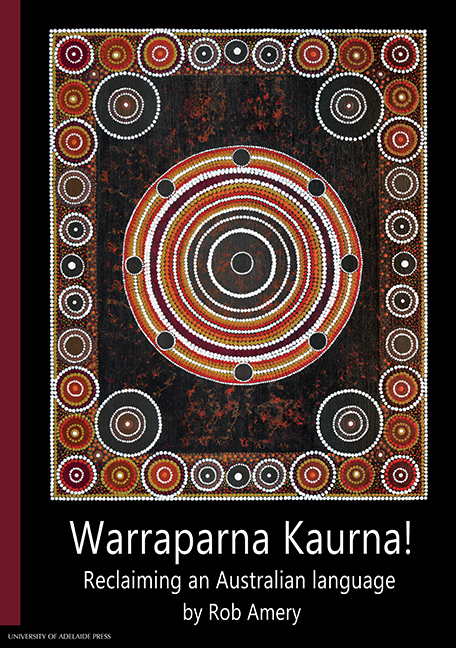Book contents
- Frontmatter
- Contents
- Maps, Plates, Graphs and Tables
- Preface to this Edition (2016)
- Foreword to the 2000 Edition
- Preface to the 2000 Edition
- Acknowledgements
- Abbreviations
- Conventions and Terminology
- Chapter 1 Locating the Study
- Chapter 2 Language Reclamation
- Chapter 3 An Ecological Approach to Language Revival
- Chapter 4 A Sociolinguistic History of Kaurna
- Chapter 5 Kaurna Sources
- Chapter 6 Restoring and Transforming the Kaurna Language
- Chapter 7 Kaurna Language Programs
- Chapter 8 Kaurna in Society
- Chapter 9 Kaurna Language Revival: The Formulaic Method
- Chapter 10 Sociopolitical Dimensions of Kaurna Language Revival
- Chapter 11 Into the Twenty-first Century: Developments since 2000
- Chapter 12 Summary and Conclusions
- Bibliography
- Index
Chapter 7 - Kaurna Language Programs
Published online by Cambridge University Press: 28 July 2017
- Frontmatter
- Contents
- Maps, Plates, Graphs and Tables
- Preface to this Edition (2016)
- Foreword to the 2000 Edition
- Preface to the 2000 Edition
- Acknowledgements
- Abbreviations
- Conventions and Terminology
- Chapter 1 Locating the Study
- Chapter 2 Language Reclamation
- Chapter 3 An Ecological Approach to Language Revival
- Chapter 4 A Sociolinguistic History of Kaurna
- Chapter 5 Kaurna Sources
- Chapter 6 Restoring and Transforming the Kaurna Language
- Chapter 7 Kaurna Language Programs
- Chapter 8 Kaurna in Society
- Chapter 9 Kaurna Language Revival: The Formulaic Method
- Chapter 10 Sociopolitical Dimensions of Kaurna Language Revival
- Chapter 11 Into the Twenty-first Century: Developments since 2000
- Chapter 12 Summary and Conclusions
- Bibliography
- Index
Summary
This project is really important for everybody because it is renewal. Andreclaiming our language is also reclaiming our heritage. I actually thought thatwe'd lost our language. I can't speak a word of Kaurna at all. But I heardCherie and Rob one day speaking it and I was over the moon about it. I was soproud to think that these people are bringing our language back to us and Ithink it will be a great thing in the future.
(Fred Warrior, Payneham Youth Centre, 27 March 1996)In the absence of much knowledge of the language within the community, formal language programs serve as the powerhouse for Kaurna language revival. This is recognised by KACHA and the Kaurna community. Most of the Kaurna language activity emanates from, or is closely associated with, formal language learning programs; these also provide a venue for use of the language and give it a role and a purpose. Most importantly, the language programs serve to develop the language skills of the teachers, which over the space of a few years have developed significantly.
In this chapter I trace the origins of Kaurna language programs, focusing on Kaurna language ecology within the education sector, and discuss issues critical to their delivery and success. My primary motivation in discussing Kaurna language programs is to investigate their place within, and relationship to, the revival of Kaurna.
Precursors of Kaurna programs in the education sector
Kaurna language programs followed interest in and teaching of other aspects of Kaurna culture within Aboriginal Studies programs, and the teaching of other Indigenous languages within Kaurna country. The introduction of the Languages Other Than English (LOTE) program also boosted interest in local languages.
A number of Kaurna people, including Lewis O'Brien, Alice Rigney, Georgina Williams and the late Gladys Elphick were intimately involved in the development of the innovative Aboriginal Studies curriculum now offered widely within South Australian schools, thus ensuring that Kaurna perspectives were included.
Ellis & Houston (1976) carried out much research into Kaurna culture and history with a view to producing resources for school programs. Their research fed into the development of later publications. In 1988, the Education Department of South Australia (EDSA) published eleven short booklets to resource Aboriginal Studies courses in primary schools.
- Type
- Chapter
- Information
- Warraparna Kaurna!Reclaiming an Australian language, pp. 172 - 202Publisher: The University of Adelaide PressPrint publication year: 2016

